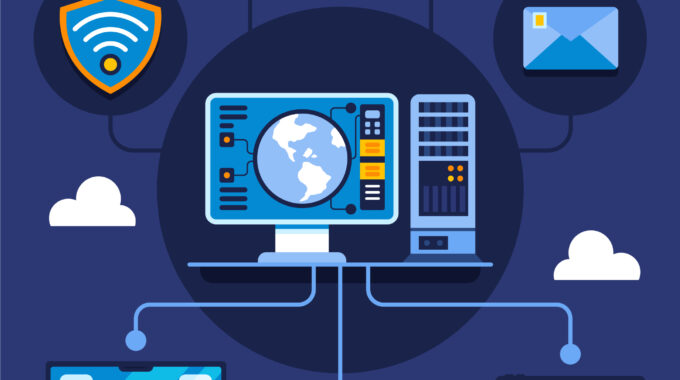Introduction To remain competitive in today's corporate environment, efficiency, speed, and precision are essential. Point-of-sale…

Comparing Cloud-Based vs. On-Premise POS Systems
Introduction
Selecting an appropriate Point of Sale (POS) system is among the most important choices a company can make. Businesses today have two primary alternatives thanks to the advancement of technology: on-premise and cloud-based point-of-sale (POS) systems. Making an informed decision requires a grasp of the distinctions between the two, as each have advantages and disadvantages. This post will examine the benefits and drawbacks of each, highlighting how they may affect a company using particular instances. This comparison will assist you in selecting the best POS system type, regardless of the size of your business—whether it’s a little café or a major chain of stores.
Cloud-Based POS Systems: Flexibility and Accessibility
You access cloud-based point-of-sale (POS) systems online, with data stored on distant servers. This allows you to access your POS system from any location with an internet connection, with all data stored in the cloud.
Flexibility and Remote Access
Flexibility is one of the main benefits of cloud-based POS systems. Let’s say you own a tiny boutique that is about to launch a second location. Even if you’re far away, you can manage both stores from a single interface with a cloud-based system. You can instantly check sales data, change inventory, and keep an eye on employee performance whether you’re at home, on the road, or in the shop. For companies that need to stay linked across several sites or for owners who aren’t always on-site, this degree of accessibility is priceless.
Automatic Updates and Maintenance
The automatic update handling of cloud-based systems is an additional advantage. For instance, when a security patch or new feature is released, it automatically updates all systems without requiring any action from you. This reduces the workload for your IT personnel by keeping your software up to date with the latest features and security protocols, or even eliminating the need for professional IT assistance altogether.
Scalability
Another benefit of cloud-based POS systems is their scalability. Let’s say you own a food truck company and you want to grow into a physical restaurant. Scaling up a cloud-based system is as easy as incorporating additional terminals or devices into your current configuration. It’s simple to expand your company without experiencing large disruptions because there’s no requirement for complicated installs or substantial hardware expenses.
Potential Drawbacks
Cloud-based systems can have some drawbacks, though. Reliability on a steady internet connection is the main worry. Processing transactions becomes impossible if your internet is unavailable, which can be a serious problem during busy business hours. For example, you could have to switch back to manual sales tracking, which is labor-intensive and prone to inaccuracy, if you’re managing a busy coffee shop and the internet goes down.
On-Premise POS Systems: Control and Reliability
On the other side, locally installed on your own servers and hardware are on-premise point of sale systems. This implies that all data is kept locally, and system management usually calls for a specialized IT staff.
Control and Customization
Control is one of the main benefits of on-premise solutions. For example, an on-premise system enables substantial customization to meet your unique demands if you manage a high-end restaurant and need custom features for menu management, reservations, and loyalty programs. The functions offered by a third-party cloud provider are not restricted, and you can customize the system to exactly fit your company’s needs.
Reliability and Performance
One further significant advantage is reliability. You can process transactions without relying on an internet connection because the system is hosted locally. This can be crucial for companies that are situated in places where internet connection is patchy. To guarantee that they can continue serving clients even in the event of internet disruptions, a rural convenience store, for instance, could prefer an on-premise system.
Data Security
Businesses managing sensitive information frequently have data protection as a top priority. With on-premise systems, you store all data locally, giving you complete control over security protocols. This level of control can be highly attractive to businesses concerned about data privacy.
It also implies that you are solely responsible for security, necessitating the implementation of strong safeguards against data breaches.
Challenges and Costs
On-premise solutions can present a unique set of difficulties, though. The initial outlay and continuing maintenance are the most important. In order to maintain the system, you’ll probably need to invest in servers, storage, and an IT staff. For instance, a sizable department store could need a lot of workers and hardware to maintain the system. Furthermore, manual installation of any software updates or system upgrades is required, which can be expensive and time-consuming.
Which is Right for Your Business?
The decision between cloud-based and on-premise POS systems ultimately depends on your business’s specific needs.
- Small to Medium-Sized Businesses: A cloud-based point of sale system is frequently the best option for small to medium-sized enterprises, especially those with many locations or those who require flexibility. Your system offers a practical and affordable solution because you can easily scale it, use minimal IT resources, and access it from any location. For example, the scalability and cheap maintenance of a cloud-based system would be advantageous to a small retail chain seeking rapid expansion.
- Larger Enterprises or Businesses with Specific Needs: However, an on-premise solution can be more appropriate if you’re a larger business with unique customisation requirements or if you operate in a location with erratic internet connectivity. The greater initial expenses and maintenance requirements may be justified by the capacity to manage every component of the system and guarantee its continuous operation even in the absence of internet connectivity. An on-premise solution would be the best option for a luxury hotel, for instance, that needs a highly tailored booking and payment system to suit its particular requirements.
Conclusion
On-site and cloud-based point-of-sale (POS) systems have different benefits and difficulties. Because of their superior adaptability, usability, and flexibility, cloud-based systems are the best choice for companies that need to remain connected and flexible. On-premise systems are a preferable option for businesses that need specific customizations and want to lessen their reliance on external factors like internet connectivity because they provide greater control and reliability.
Through meticulous evaluation of your company’s unique requirements, expansion strategies, and technological capacities, you may select the point-of-sale system that will optimize your business processes and augment the clientele’s experience. The ideal point-of-sale (POS) system, whether hosted on-site or in the cloud, helps you better serve your clients and aligns with your business objectives.




